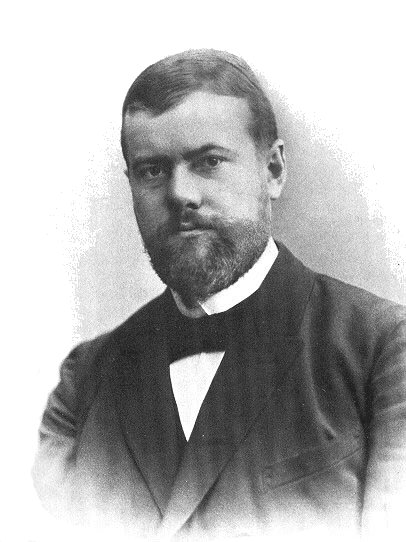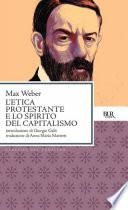Origine: Da Sociologia delle religioni.
Lavori
Max Weber frasi celebri
Origine: Il lavoro intellettuale come professione, p. 29
Origine: Il lavoro intellettuale come professione, p. 20
L'etica protestante e lo spirito del capitalismo
L'etica protestante e lo spirito del capitalismo
Frasi sulla vita di Max Weber
Origine: Citato in Ulla Berkéwicz, Forse stiamo diventando pazzi.
Il lavoro intellettuale come professione, Incipit
Il lavoro intellettuale come professione
Max Weber Frasi e Citazioni
L'etica protestante e lo spirito del capitalismo
L'etica protestante e lo spirito del capitalismo
“La burocrazia è tra le strutture sociali più difficili da distruggere.”
Origine: Citato in Focus, n. 114, p. 151.
Origine: Da La scienza come professione, Einaudi, Torino, 2004, p. 12.
Origine: Da Il socialismo, in Scritti politici, traduzione di A. Cariolato ed E. Fongaro, Donzelli Editore, 1998.
Origine: Il lavoro intellettuale come professione, p. 18
Origine: Il lavoro intellettuale come professione, p. 89
“È destino del nostro tempo… soprattutto… il disincanto del mondo.”
Origine: Citato in AA.VV., Il libro della sociologia, traduzione di Martina Dominici, Gribaudo, 2018, p. 41. ISBN 9788858015827
Max Weber: Frasi in inglese
Origine: From Max Weber: Essays in Sociology (1946), p. 152 (in 2009 edition)
Origine: The Protestant Ethic and the Spirit of Capitalism (1905; 1920), Ch. 2 : The "Spirit" of Capitalism
Origine: Religion of India (1916), pp. 9-10
Max Weber, , 1916.
Contesto: Mysticism intends a state of "possession," not action, and the individual is not a tool but a "vessel" of the divine. Action in the world must thus appear as endangering the absolutely irrational and other-worldly religious state. Active asceticism operates within the world; rationally active asceticism, in mastering the world, seeks to tame what is creatural and wicked through work in a worldly "vocation" (inner-worldly asceticism). Such asceticism contrasts radically with mysticism, if the latter draws the full conclusion of fleeing from the world (contemplative flight from the world). The contrast is tempered, however, if active asceticism confines itself to keeping down and to overcoming creatural wickedness in the actor's own nature. For then it enhances the concentration on the firmly established God-willed and active redemptory accomplishments to the point of avoiding any action in the orders of the world (asceticist flight from the world). Thereby active asceticism in external bearing comes close to contemplative flight from the world. The contrast between asceticism and mysticism is also tempered if the contemplative mystic does not draw the conclusion that he should flee from the world, but, like the inner-worldly asceticist, remain in the orders of the world (inner-worldly mysticism).
In both cases the contrast can actually disappear in practice and some combination of both forms of the quest for salvation may occur. But the contrast may continue to exist even under the veil of external similarity. For the true mystic the principle continues to hold: the creature must be silent so that God may speak.
Max Weber, , 1916.
Contesto: Mysticism intends a state of "possession," not action, and the individual is not a tool but a "vessel" of the divine. Action in the world must thus appear as endangering the absolutely irrational and other-worldly religious state. Active asceticism operates within the world; rationally active asceticism, in mastering the world, seeks to tame what is creatural and wicked through work in a worldly "vocation" (inner-worldly asceticism). Such asceticism contrasts radically with mysticism, if the latter draws the full conclusion of fleeing from the world (contemplative flight from the world). The contrast is tempered, however, if active asceticism confines itself to keeping down and to overcoming creatural wickedness in the actor's own nature. For then it enhances the concentration on the firmly established God-willed and active redemptory accomplishments to the point of avoiding any action in the orders of the world (asceticist flight from the world). Thereby active asceticism in external bearing comes close to contemplative flight from the world. The contrast between asceticism and mysticism is also tempered if the contemplative mystic does not draw the conclusion that he should flee from the world, but, like the inner-worldly asceticist, remain in the orders of the world (inner-worldly mysticism).
In both cases the contrast can actually disappear in practice and some combination of both forms of the quest for salvation may occur. But the contrast may continue to exist even under the veil of external similarity. For the true mystic the principle continues to hold: the creature must be silent so that God may speak.
Max Weber, letter to Ferdinand Tönnies, Feb. 19, 1909; As cited in: . Uncertain Victory: Social Democracy and Progressivism in European and American Thought, 1870-1920. Oxford University Press, 24 mrt. 1988. p. 498
Contesto: When I studied modern Catholic literature in Rome a few years ago, I became convinced how hopeless is to think that there are any scientific results this church cannot digest... I could not honestly participate in such anti-clericalism. It is true that I am absolutely unmusical in matters religious and that I have neither the need nor the ability to erect any religious edifices within me — that is simply impossible for me, and I reject it. But after examining myself carefully I must say that I am neither anti-religious nor irreligious. In this regard too I consider myself a cripple, a stunted man whose fate it is to admit honestly that he must put up with this state of affairs (so as not to fall for some romantic swindle)... For you a theologian of liberal persuasion (whether Catholic or Protestant) is necessarily most abhorrent as the typical representative of a halfway position; for me he is in human terms infinitely more valuable and interesting... than the intellectual (and basically cheap) pharisaism of naturalism, which is intolerably fashionable and in which there is much less life than in the religious position (again, depending on the case, of course!)
Max Weber, , 1916.
Contesto: Mysticism intends a state of "possession," not action, and the individual is not a tool but a "vessel" of the divine. Action in the world must thus appear as endangering the absolutely irrational and other-worldly religious state. Active asceticism operates within the world; rationally active asceticism, in mastering the world, seeks to tame what is creatural and wicked through work in a worldly "vocation" (inner-worldly asceticism). Such asceticism contrasts radically with mysticism, if the latter draws the full conclusion of fleeing from the world (contemplative flight from the world). The contrast is tempered, however, if active asceticism confines itself to keeping down and to overcoming creatural wickedness in the actor's own nature. For then it enhances the concentration on the firmly established God-willed and active redemptory accomplishments to the point of avoiding any action in the orders of the world (asceticist flight from the world). Thereby active asceticism in external bearing comes close to contemplative flight from the world. The contrast between asceticism and mysticism is also tempered if the contemplative mystic does not draw the conclusion that he should flee from the world, but, like the inner-worldly asceticist, remain in the orders of the world (inner-worldly mysticism).
In both cases the contrast can actually disappear in practice and some combination of both forms of the quest for salvation may occur. But the contrast may continue to exist even under the veil of external similarity. For the true mystic the principle continues to hold: the creature must be silent so that God may speak.
Origine: The Protestant Ethic and the Spirit of Capitalism
Origine: From Max Weber: Essays in Sociology
Origine: From Max Weber: Essays in Sociology (1946), p. 124; Essay "Politics as a vocation"
Contesto: The problem — the experience of the irrationality of the world — has been the driving force of all religious evolution. The Indian doctrine of karma, Persian dualism, the doctrine of original sin, predestination and the deus absconditus, all these have grown out of this experience. Also the early Christians knew full well the world is governed by demons and that he who lets himself in for politics, that is, for power and force as means, contracts with diabolical powers and for his action it is not true that good can follow only from good and evil only from evil, but that often the opposite is true. Anyone who fails to see this is, indeed, a political infant.
Prefatory Remarks to Collected Essays in the Sociology of Religion (1920)
Origine: From Max Weber: Essays in Sociology (1946), p. 135 (in 2009 edition)
Origine: Religion of India (1916), p. 18
Origine: Sociology of Religion (1922), pp. 216-217
Origine: The Protestant Ethic and the Spirit of Capitalism (1905; 1920), Ch. 5 : Asceticism and the Spirit of Capitalism
Origine: Religion of China (1915), p. 246
Origine: The Protestant Ethic and the Spirit of Capitalism (1905; 1920), Ch. 2 : The "Spirit" of Capitalism
Origine: Religion of India (1916), p. 16
In other words, lower wages were believed to enhance worker productivity.
Origine: The Protestant Ethic and the Spirit of Capitalism (1905; 1920), Ch. 2 : The "Spirit" of Capitalism
Max Weber, General Economic History, trans. by Frank Knight, 1961. p 265
Max Weber, “Objectivity in Social Science and Social Policy” (1904)
Origine: The Protestant Ethic and the Spirit of Capitalism (1905; 1920), Ch. 5 : Asceticism and the Spirit of Capitalism
Max Weber (1949/2011), Methodology of Social Sciences, Edward E. Shils & Henry A. Finch (transl. & ed.). p. 55
“"Rationalism" is a historical concept that contains within itself a world of contradictions.”
Origine: The Protestant Ethic and the Spirit of Capitalism (1905; 1920), Ch. 2 : The "Spirit" of Capitalism
Origine: The Protestant Ethic and the Spirit of Capitalism (1905; 1920), Ch. 1 : Religious Affiliation and Social Stratification
Origine: Religion of China (1915), p. 235
Origine: The Protestant Ethic and the Spirit of Capitalism (1905; 1920), Ch. 4 : The Religious Foundations of This-Wordly Asceticism
Origine: From Max Weber: Essays in Sociology (1946), p. 42;
"Science as a Vocation" (1917)
"Science as a Vocation" (1917)

